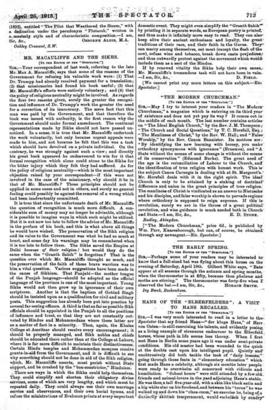MR. MACAULIFFE AND THE SIKHS. [To THE EDITOR OF THE
" tiracr■-roa."]
SIR,—Your correspondent of last week, referring to the late Mr. Max A. Macauliffe, says that some of the reasons of the Government for refusing his valuable work were : (1) That Dr. Trumpp had already received payment for a translation; (2) that missionaries had found his book useful ; (3) that Mr. Macauliffe's efforts were entirely voluntary ; and (4) that the policy of religious neutrality might be involved. As regards the first two reasons given, surely the greater the recogni- tion and influence of Dr. Trunipp's work the greater the need for a correction of its inaccuracy. The mere fact that this
man was paid by the Government, and that therefore the book was issued with authority, is the first reason why the Government should make formal amendment. The continual representations made by Sikhs should not have passed un- noticed. In a sense, it is true that Mr. Macauliffe undertook the work voluntarily, but only because urgent appeals were made to him, and not because he felt that this was a task which should have devolved on a private individual. On the contrary, he was strongly against such a view ; and directly his great book appeared he endeavoured to win for it that formal recognition which alone could atone to the Sikhs for the bitter injury which they felt they had suffered. As for the policy of religious neutrality—which is the most important objection raised by your correspondent—if this were not involved in the case of the missionary, why should it be in that of Mr. Macauliffe ? These principles should not be applied in some cases and not in others, and surely no general feeling could possibly be against the removal of a wrong which had been inadvertently committed.
It is true that since the unfortunate death of Mr. Macauliffe the question of recognition is much more difficult. A con- siderable SUM of money may no longer be advisable, although it is possible to imagine ways in which such might be utilized. But it is not now too late to follow the advice of Mr. Macauliffe in the preface of his book, and this is what above all things he would have wished. The preservation of the Sikh religion and its value to the Government was what he had so much at heart, and some day his warnings may be remembered when it is too late to follow them. The Sikhs saved the Empire at Delhi because of their religion ! but would they do the same when the " Granth Sahib" is forgotten ? That is the question over which Mr. Macauliffe thought so much, and the preservation of the faith of these brave warriors was to him a vital question. Various suggestions have been made in the cause of Sikhism. That Panjabi—the mother tongue of the Punjab language—should be adopted as the official language of the province is one of the most important. Young Sikhs would not then grow up in ignorance of their own scriptures. Another is that the baptism of Gobind Singh should be insisted upon as a qualification for civil and military posts. This suggestion has already been put into practice by several far-seeing officers. A third is that as far as possible Sikh officials should be appointed in the Punjab to all the positions of influence and trust, so that they are not constantly out- voted by Hindue and Mohammedans where these latter are as a matter of fact in a minority. Then, again, the Khalsa College at Amritsar should receive every encouragement ; it should be properly managed, and Sikh nobles and chiefs should be educated there rather than at the College at Lahore, where it is far more difficult to maintain their distinctiveness. Certain Hindu temples and Mohammedan mosques receive grants-in-aid from the Government, and it is difficult to see why something should not be done in aid of the Sikh religion, which, Mr. Macauliffe asserts, must perish without State support, and be crushed by the "boa-constrictor," Hinduism. . There are ways in which the Sikhs could help themselves. They could simplify and shorten their obligatory divine services, some of which are very lengthy, and which must be repeated daily. They could always use their own marriage service and observances, and their own burial hymns, and refuse the ministrations of Brahman priests at every iuipoi tent
domestic event. They might even simplify the "Granth Sahib' by printing it in separate words, as European poetry is printed, and thus make it infinitely more easy to read. They can also- keep alive their ancient enthusiasm and loyalty, the great traditions of their race, and their faith in the Gurus. They- can marry among themselves, eat meat (except the flesh of the cow), refuse wine and tobacco, break down caste prejudicee,2 and thus outwardly protest against the movement which would include them as a sect of the Hindus.
If by renewed vitality the Sikhs help their own cause,- Mr. Macauliffe's tremendous task will not have been in vain.
—I am, Sir, &e., D. FIELD. [We cannot print any more letters on this subject.—ED: Spectator.]


























































 Previous page
Previous page